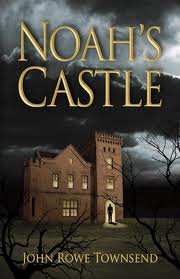Noah’s Castle by John Rowe Townsend
Reviewed by Jennifer

Ratings Explanation
Language: Several profanities and less than 10 swear words
Violence: Mr. Mortimer shoots a man. There is a fight between two groups of people.
Sexual Content: It is mentioned that in desperate times some women turn to prostitution. “You can have a girl for a can of beans.”
Adult Themes: Economic collapse and the effect on individuals and society. Family members betray their father. Mr. Mortimer makes sexist remarks about his wife, her inferior intelligence and women in general. Needs of individuals vs. the needs of society.
Synopsis
England is headed for an economic meltdown and Mr. Mortimer sees it coming. “The headlines were full of economic gloom, ever-rising prices, political squabbles.” In the midst of the rising turmoil, Mr. Mortimer unexpectedly moves his family from their comfortable, cozy home to a large, old, drafty estate. Mysteriously, he begins spending much of his time in the cellar, leaving his family to wonder what he could possibly be doing down there.
As the crisis escalates, food and necessities become scarce and the government proclaims that hoarding food is illegal. The Mortimers always have enough to eat, but they do not share with others. The teenage children see this inequality and almost resent the fact that they have enough when so many others are struggling to stay alive. Will their family survive the crisis? And if so, at what cost?
Noah’s Castle does not focus on character or plot development. Although some of the characters learn lessons and change to some degree, no one is much different at the end of the book than they were at the beginning. However, the characters, especially Mr. Mortimer, and their actions in certain situations are very interesting to study and consider. The plot is not very compelling in and of itself, but the great interest of the book lies in the fascinating questions it poses and how easily they can be argued from opposing positions. I finished the book over a week ago and I am still trying to decide how I feel about the family’s reactions and how I would act in a similar situation.
The most compelling question for me is, “What is our responsibility to our fellow beings?” Is a family responsible solely for each other and no one else? Mr. Mortimer states, “I would leave everyone in the world to die before I would stop protecting my own.” Is this how I feel as a mother? Right now I emphatically say NO! But if a situation arose where helping others could actually compromise the safety and well being of my own children, would I help another or protect my own?
This would be a stimulating book for a group discussion. I am going to recommend it to my friend who teaches high school English. I would love to hear the discussion of teenagers on this topic.










